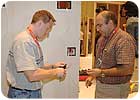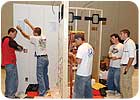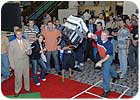
Crestron Electronics Inc.’s training at the company’s headquarters in Rockleigh, N.J., takes the form of PowerPoint presentations or videos, with work stations furnished to let installers follow the program hands-on.
As Meghan Henning, spokeswoman for the Consumer Electronics Association (CEA), Arlington, Va., says, “It’s tough to keep on top of this industry. But training should be considered a priority even for very busy integrators. It will help you in the end. You will be better able to market yourself, because you’ll have better education and training than your competition. That’s one thing that sets installers apart.”
Fortunately, associations and manufacturers understand installers’ training dilemma and make training available in a number of formats designed to help installers remain up-to-date while continuing to serve the needs of their clients.
Some observers believe installers are not as well-trained as they could be, but they acknowledge the challenge in keeping up-to-date with technological change while dealing with day-to-day business.
John Ryder, vice president of customer service and technical support for Honeywell Security, Syosset, N.Y., believes installers are trained “only to a certain degree.”
Many companies offer new products or improved versions of them with which technicians are unfamiliar, leaving installers guessing or telephoning a call center for help, he notes. Other, smaller companies do not undertake regular training because they think they are too busy to train.
“If only they could see that trained installers are more productive,” he adds. “A good installer is one who seeks out training and reads the installation instructions prior to arriving at a job site.”
For his part, Ron DeMille, TEC manager for Russound, Newmarket, N.H., says there is much to be done in training installers. “But that can be said about anything where there isn’t a college course and degree along with it,” he adds. “Everyone has their work cut out for them in getting these installers up to par.
“There are some very good installers out there,” he emphasizes. “However, this is an industry that’s really been booming for the last 10 years. There are a lot more people entering the A/V installation industry, coming from other types of industries, like security and burglar alarm installation. There are idiosyncrasies between these industries, and that’s what’s missing [in the scope of installers’ knowledge].”

Installing lighting and control wiring, drilling holes for speaker wires, installing speakers or hooking up amplifiers are some of the hands-on experiences provided in the boot camps of the Custom Electronic Design and Installation Association (CEDIA), Indianapolis.
WHAT MAKES A GOOD INSTALLER?
Dale Eller, education and standards director for the National Training School (NTS) of the National Burglar and Fire Alarm Association, Irving, Texas, agrees that installers need more training.“If you talk with the tech services department of the average manufacturer, they will tell you that the training the technicians have is lacking,” he asserts. “The manufacturers report a lot of the installers don’t have the basic, fundamental training.”
What makes a good installer, he adds, is the willingness to embrace lifelong learning. Those who recognize their role is not just running wires and mounting control panels on the wall, but protecting property, saving lives and providing whole-house communications capabilities tend to be much more invested in their careers and interested in the overall impact of what they do, he says.
Asked what he thinks of installers’ training, Ken Erdmann, the education council chair of the Custom Electronic Design and Installation Association (CEDIA), Indianapolis, and president of Erdmann Electric Inc., Springville, Utah, remarks, “I own a small installation company. I see some qualified competitors, and some guys who belong behind bars for doing slipshod work.”
Good installers tend to be conscientious and care for the homes of their clients as much or more than their own, Erdmann believes. They also are able to trouble-shoot and avoid problems or solve them. All possess attention to detail.
Also judging installers’ training levels, Jeff Singer, spokesman for Crestron Electronics Inc., Rockleigh, N.J., believes, “By and large, they are not well-trained. It’s time and expense. It’s understandable.
“A lot of these installers don’t have a lot of people,” he concedes. “To take people out of the field is to stop work. That monthly cash flow is their bloodline, and they don’t want to stop it.
“But by the same token, what makes a good dealer and helps you grow your business is to be educated, trained and be able to deliver solutions other dealers can’t, to add value to your client,” Singer points out. “And in order to stay relevant and stay on the cutting edge, and deliver the latest and greatest solutions available, you have to be educated and trained.”
In Singer’s view, what makes a good installer is the ability to stay informed and educated, and to form partnerships with vendors, designers, architects, electricians and HVAC installers, so they can work effectively with these subcontractors. Additionally, the best installers possess the ability to listen and respond to clients.
“You want to meet their expectations and manage their expectations,” he says. “If you can manage their expectations, you can better exceed those expectations.”

CEDIA TRAINING
One of the more all-inclusive educational options available for home control installers is training provided by associations like the Custom Electronic Design and Installation Association (CEDIA), Indianapolis, the TechHome division of the Consumer Electronics Association (CEA), Arlington, Va., or the National Training School (NTS) of the National Burglar and Fire Alarm Association (NBFAA), Irving, Texas.CEDIA’s most important mission is the education of its members, says Erdmann, who also is a member of CEDIA’s board of directors.
The annual CEDIA Expo, which this year will be held in Denver Sept. 5-9, features courses provided by volunteer subject matter experts working in conjunction with professional instructional designers. Courses are three hours long, with seminars lasting 90 minutes to three hours. Workshops also are held that run an entire day, and boot camps cover two or three days.
“These boot camps allow hands-on experience in drilling holes for speaker wires, installing speakers or hooking up amplifiers, for example,” Erdmann says.
The CEDIA Expo also gives members the opportunity to visit exhibits staffed by representatives of manufacturers, many of whom provide hands-on and classroom-style training at the expo. “A lot of attendees will go just to spend time with the manufacturers,” Erdmann says.
“The nice thing about this show is we get so many manufacturers in one place that an attendee can bounce from one manufacturer’s training to another and spend quality time with 12 or 15 or even more manufacturers, depending on their schedules,” he points out.
Some CEDIA member companies pay for their employees to attend the expo. Others allow their employees to attend but require them to pay their own way to the show, with the understanding that if their skills are enhanced, they may be in line for a promotion, a salary hike or both. The latter is more common, Erdmann says.
“I’ve been with CEDIA since 1992, and have seen many newbies come through the training, and then graduate,” he remarks. “Some years later, you’ll see them owning their own companies, or in many cases they are in management of the companies they stayed with. Companies know their most important asset is a skilled employee.”

Classroom instruction is provided by the Custom Electronic Design and Installation Association (CEDIA), Indianapolis, at its annual expo.
TECHHOME TRAINING
The Consumer Electronic Association’s TechHome division brings together all the home technologies that go into new and existing homes. It is another alternative for installers seeking training opportunities, says CEA spokeswoman Meghan Henning.TechHome sponsors the Electronic House Expo (EHX), which stages two trade shows annually, one in the spring on the East Coast, and another in the fall on the West Coast. This fall’s EH Conference and Expo West is Nov. 6-9 in Long Beach, Calif.
The shows feature five days of training, allowing installers to train on a track consistent with their own level of expertise. In the spring session alone, approximately 100 free classes were offered at EHX, allowing manufacturers to offer product-specific training to attendees, Henning says.
“There’s a ton of training available, literally free from these manufacturers,” she notes. “It’s a Who’s Who of manufacturers who come to EHX. You don’t have to spend your entire budget on training.
“Every day you attend the conference, you could go from course to course and learn about these very specific products,” Henning says. “And that’s a great way to learn.”
Another approach is to pursue training through certification programs offered by TechHome, CEDIA and other industry associations, says Jay McLellan, chairman of the TechHome Division of CEA and president and CEO of Home Automation Inc. (HAI), New Orleans.
In addition, numerous community colleges offer a course called Home Technology Integrator (HTI), “which provides the basics of how to understand this business,” he adds.
“Then follow the CEA newsletter,” McLellan suggests. “Even if you aren’t installing something specific, you can know all about it, so you can be an expert in front of your customer.
“Finally, once you are a customer of a manufacturer, it’s important you keep up with their training,” he recommends. “Manufacturers don’t want to lose you as a customer, so they tend to make their products understandable to you as a customer and do a good job with training.”

The equipment toss is one of the more entertaining events that is part of the Installer Olympics at the annual expo of the Custom Electronic Design and Installation Association (CEDIA), Indianapolis.
NTS TRAINING
For installers involved in security installations, the NTS offers the Level 1 Certified Alarm Technician Program, which remains the most popular course the NTS offers, and the Level 2 Certified Alarm Technician course.Classroom offerings are available through a network of 32 chartered state associations with which the NBFAA has relationships. In states without state chapters, the NBFAA offers the courses directly. About 150 classes are scheduled each year around the country, Eller reports.
Additionally, the NTS and NBFAA offer in conjunction with Bedrock Learning Inc. training in the fundamentals of home technology installation, sales and the business for installers, sales, customer support, and other residential technology professionals. This includes audio and video distribution along with home theater and home networking.
“The intended purpose of offering these courses is to provide our members valuable training on the related systems that they are integrating with or incorporating into their current installations,” Eller explains.
Among the topics covered by the Bedrock Learning training are the fundamentals of structured wiring, whole house audio technology and distribution, home theater design and installation, residential telephone and communications, residential lighting control and home networking for installers. These courses are accredited for NBFAA/NTS continuing education (CEU) credits.
“Between what we have online and classroom seminars, we offer several thousand continuing education seminars, offered by various manufacturers, our state chapters and groups providing training,” Eller says. “But what’s unique about that is because they are accredited, the state groups look to the NBFAA as a clearinghouse for what is considered appropriate continuing education.”
Seven other security courses are offered by the NBFAA: Advanced Burglar Alarm Technician, Fire Alarm Installation Methods, Life Safety Code, Understanding Alarm Systems, Central Station Training, Electronic Access Control and Security Networking Institute.
The Level 1 Certified Alarm Technician, Advanced Burglar Alarm and Fire Alarm Installation Methods courses are all offered online, with the remainder provided only in classroom environments.
In addition to offering its own courses, the NBFAA accredits third-party courses for continuing education. Although most of the foundational training through the eight courses offered by NTS is paid for by individual installers or the companies for which they work, much of the continuing education is provided by manufacturers at little or no cost to installers.

MANUFACTURER TRAINING
Installers also can look directly to manufacturers for training options, among them Honeywell Security. The company has more than 60 NTS-approved classes, and new classes are developed and offered to installers as technology evolves, says Ryder. In those states mandating it, classes are submitted for CEU credits, he adds.Another manufacturer known for comprehensive training is GE Security, Bradenton, Fla. The company is focused on communication and IT for security, safety and lifestyle enhancement, says residential marketing leader Kirk MacDowell.
GE Security offers more than 100 classes in a variety of different forms. They include Web-X training, in which trainees can access training programs through their computers; in-person training, in which trainers travel to dealers’ offices; training seminars across the U.S., to which dealers can send their installers; and classes offered through standard CD tutorials, MacDowell reports.
Before coming to GE, MacDowell was a dealer for a quarter-century. One lesson he absorbed over that period was that not all technicians learn the same way.
Some learn best while working hands-on or dealing one-on-one with an instructor, while others learn through visuals like Web-X. As a result, GE Security offers a variety of options.
“I sincerely believe that training is one of the best things we can do for the installer base,” he says. “And that’s why we take it very seriously here. The majority of the training we provide is at no cost to our dealers.”
Russound also makes education a priority. “Training has become a very important part of doing business in this industry,” says DeMille. “We recognize the importance of training and educating our customers, and have devoted a department focused specifically on educating our installers, our sales rep force and even consumers.”
According to Russound’s marketing coordinator S. Nicole Gauthier, training not only fosters dealer loyalty, but also offers the company a valuable opportunity to learn from dealers.
The manufacturer of audio-video distribution and control systems provides a four-tier program for education that includes online training 24 hours a day, seven days a week, and training at numerous annual trade shows, she reports.
Additionally, the company is offering two new initiatives. The first is the Russound Road Show, which travels to 26 U.S. cities to give installers a chance to interact with Russound’s TEC specialists or trainers and acquire a level of hands-on training. The second is in-house training at its state-of-the-art facility in Newmarket.
There, installers spend two days participating in an “extensive hands-on training seminar in everything the company does,” Gauthier says. These two new initiatives have recently received course accreditation from CEDIA and NBFAA, she adds.
The Crestron Technical Institute has 15 worldwide training facilities with 20 employees who work on training, says Singer. They include six full-time administrators, two full-time trainers and 20 other employees who contribute part-time to the development, implementation and execution of the training and certification programs.
The company is known for customized home control solutions and sells everything from home theater and surround control systems to drape control, intercoms, camera controls, thermostats and humidistats.
It provides a dozen different types of classes and more than 100 scheduled live courses, Singer notes. It has trained more than 5,000 installers and programmers in the field.
In-person training takes the form of PowerPoint presentations or videos, with work stations furnished to let installers follow through the program hands-on, Singer says.
Printed materials are provided that installers can take with them following the training. “Ideally, any initial training would happen in person,” he adds. “Any follow-up or continuing education can be obtained through online options.
“To take someone out of the field is very difficult for many small businesses,” he admits. “Here’s a way to provide the training online and not interrupt their business flow as much.”
As for cost, Singer says, “the only thing your dealers and independent programmers have to pay for is travel and hotel. We feed them, entertain them, provide the training and provide equipment or materials.”
The bottom line? Even as technological change makes training increasingly necessary, technology is making training more readily available and easier to access.
As Russound’s DeMille observes, “Educational resources will become easier to obtain with technologies today. But face-to-face conversation will always be the most beneficial.
“However, it’s possible to have face-to-face conversations without standing right next to the person,” he points out. That may be the best news of all for installers facing the training dilemma.
Sidebar: Distributor Training
ADI, Melville, N.Y., is partnering with the Custom Electronic Design & Installation Association (CEDIA), Indianapolis, to deliver Home Theater Audio Boot Camps at ADI branches nationwide. The half-day workshops run every month from May through December. For more information, visithttp://www.adilink.com.AVAD, Van Nuys, Calif., holds more than 450 home theater, whole-house control and electronic integration training sessions annually. Among the subjects are plasma television installation, lighting, computer networking, programming, working with builders, home theater, whole-house audio, central vacuum, telephony and more.
Sessions are offered in the classroom and on the phone or Internet for scheduling flexibility. To locate a session in your area, call (866) FOR-AVAD. For more information, visitwww.avad.com.
Tri-Ed Distribution includes training sessions through the company’s Home Technology Tour. Tri-Ed trains its own staff internally through its Master’s Training Program and can troubleshoot any questions on the branch level. For more information, visitwww.tri-ed.com.
Sidebar: Training Contacts
ADI:For more information on CEDIA boot camps, visithttp://www.adilink.com.AVAD:To locate a session in your area, call (866) FOR-AVAD or visitwww.avad.com.
CEDIA:Visitwww.cedia.netfor contact information and online applications.
CEA’s TechHome Division:Call (866) 858-1555 or visitwww.ce.organd click on “Contact us.”
EH Expo:www.ehxweb.com
National Training School (NTS) of the NBFAA:Call (866) 636-1687 or visitwww.alarm.org. Bedrock Learning (616) 335-6206 orwww.bedrocklearning.com
Honeywell Security:Training may be requested via the Web site,www.honeywell.com.
GE Security Training Center, Tualatin, Ore.:E-mail:infra-cvo-training@ge.comor call (503) 885-5884
GE Security Training Center, Bradenton, Fla.:Email:training.gesecurity@ge.comor (800) 655-4497
Russound:Visitwww.russound.com/eduto learn more about educational programs. The site’s “Document Center” also provides product literature, product manuals, technical updates and tips.
Tri-Ed Distribution:E-mail:www.tri-ed.comor call (516) 941-2800
Crestron Electronics Inc.:Visitwww.crestron.comto register for courses.


